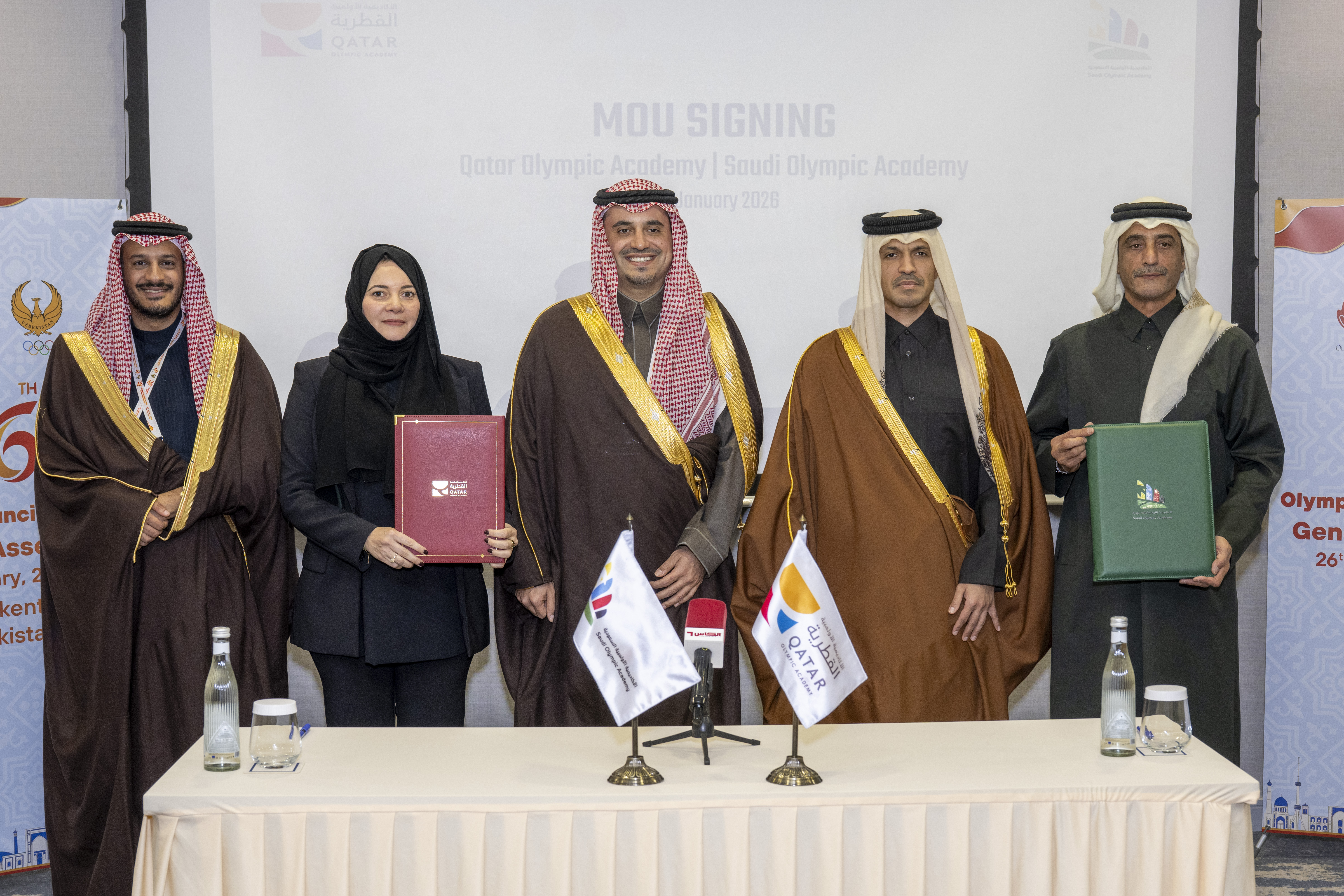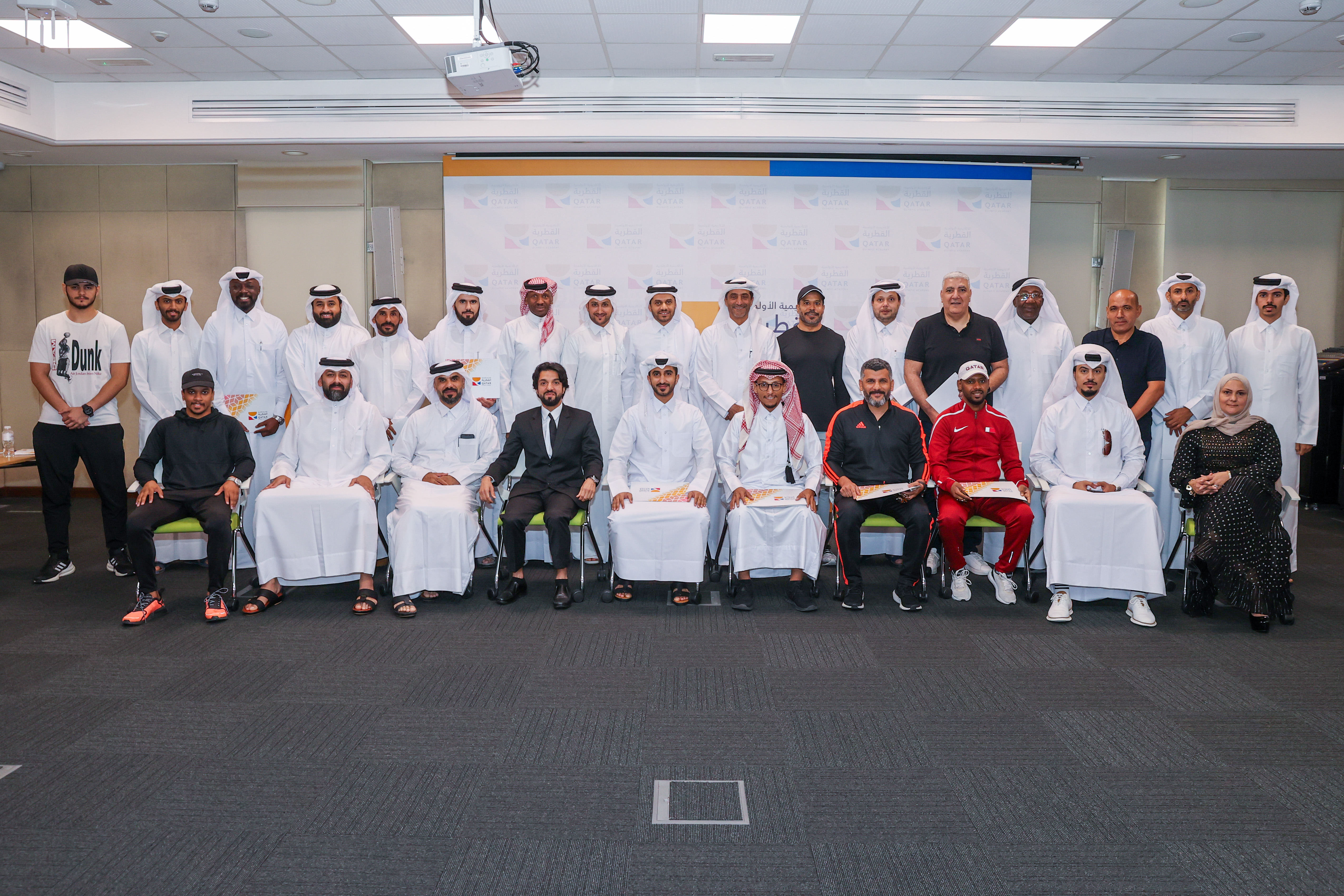Doha:
The Qatari Olympic Academy concluded today ' s psychiatry course for athletes, which lasted from 5 to 9 May and which was attended by more than 30 students from inside and outside the State of Qatar.
This course was marked by the fact that its participants represent numerous sports, administrative and artistic disciplines, including athletes, trainers, administrators, physical educators and former athletes, such as Captain Issa Basham, our former national champion of mid-range power games, the father of our Olympic and world champions, a champion of high-founcing championships, our national guard and the Sad Club, and a three-year-old hero of Immunism, a former Al-Sad Club player, Hamud Al-yazidi, a hero of his deafness, Ali Saleh Al-Hajri, and other prominent athletes on the local and global scene.
The psychological training course for athletes is a major entry point and an important starting point for the organization of a number of more specialized and deeper courses in sports psychology, as it has paved the way for students to go more deeply in this field of science to move towards more specialized courses.
The course was presented by Dr. Issa Abdullah al-Moslimani, Deputy Director of the Academie Espair School, who held many positions in this field, both with federations and sports clubs, including the Qatari Gymnastics Federation and the Dakhle Sports Club, and worked with the Development Department of the Qatari Football Federation.
The Muslim doctor spoke of the psychological strength of athletes, where modern-day sports training is based on the scientific foundations for the comprehensive development of the various elements of preparation, whether physical, skillful, planning or psychological, in order to bring the player to the highest levels of sports.
Psychological numbers are one of the essential components of the training module without which success in sports is impossible. In recent years, the psychological factors of athletes are becoming increasingly important. The exercise is not only about developing physical qualities and creating motor midwives but also about improving psychological qualities and refining the psychological strength of the trainees. Thus, sports activity requires athletes to initiate psychological qualities to achieve high results. On the other hand, this activity is a powerful and effective means of developing and building these psychological qualities.
On the second day, the doctor spoke of the body language of athletes at different stages, which became a very important part of the world of sports, with the rapid and continuous evolution of the scene of our lives in general. It has become common to hear many interpretations and to read various theories and studies about the causes of a particular situation in which data and results are consistent or different. This has become a matter of all aspects of our lives or interests, including football or sports in general, which are no longer limited to exercises, exercises, skills and tactics, but have spread to other areas that we did not expect to receive similar attention in the past.
Psychiatry before the game is completely different from the body language of the players inside the field. It's a different story, the details of which are written in the faces of the players, the movement of their bodies and the way they communicate with each other with signals, a story that tells us everything without any words being spoken.
These signals reflect what's inside the player and reveal what he wants without having to say a single letter. This is something that players inside the field need to deliver messages to each other, either by raising the eyebrow or by moving the hand without being exposed by the opponent. Studies show that athletes generally outstrip ordinary people by sending, receiving, and acting quickly after these signals with a view to moving to register or impeding the opponent.
On the third day, Muslims spoke of the role of psychological factors and their impact on sports performance. The player faces many situations that are directly related to psychological preparation, both during the exercise and sports competitions, and their respective changing events. Here it has a clear and direct impact on the player ' s behaviour and on the level of his abilities, skills and relationship with others. Psychiatric preparation is one of the essential components of modern sports training without which it is impossible to achieve sporting achievements.
The fourth day was a lecture on modern applications in sports psychology. This section is concerned with the study of psychological factors and the application of psychological information and theories in the field of various sports activities, using the scientific research curriculum to study any problems or phenomena that merit study in this area.
The aim of this is to understand the psychological factors necessary for the efficient performance of sporting activity. Sports psychology is also concerned with studying the impact, relevance and effectiveness of different psychological phenomena and resolving them, such as "indication, attention, awareness, the effect of the anomaly, perseverance, training and motoristic sensory skills on the win or defeat of the player or team.
In the same vein, Mr. Khalil Al Jaber, Executive Director of the Olympic Academy, said that sports psychology was an important discipline that studied the psychological factors in sports performance in order to improve the performance of athletes. In addition to the normal capacity to carry out daily duties, human beings had additional potential that they could be used better to raise their level of sport by understanding and interpreting sports behaviour and the factors that influenced it by the team ' s administrative and technical organs, all with a view to increasing the efficiency of athletes and the administrative and technical organs that would be reflected in the results of national elections in external partnerships.
As Dr. Issa Al-Moslamani (attendants of the session) said, first of all, I thank the Qatari Olympic Academy for highlighting mathematical psychology, which has a positive impact on the evolution of any performance and has become one of the cornerstones of the evolution of divisions, administrators and rulers.
I was pleased with the segment that attended the course and the extent to which they interacted with the topics, especially as specialists from players, administrators and trainers, and I see that these courses are important and must be repeated and given greater attention to their usefulness and positive reflection at the level of players and teams in a very large way.
At the end of this month, the Academy offers a course on sports media that will be offered by the media at Ali al-Moslimani, the director of the news channel bein sports, which will last for five days from 19 to 23 May.
More news

Qatar Olympic Academy Celebrates Graduation of Postgraduate Program Participants
Doha – February 17, 2026: Under the patronage of His Excellency Sheikh Joaan bin Hamad Al Thani, President of the Qatar Olympic Committee and Chairman of the Qatar Olympic Academy, the Academy celebrated this morning the graduation of students from its postgraduate programs at the headquarters of the Qatar Olympic Committee.

Qatar Olympic Academy Concludes Course on “Physical Activity and Autism”
Doha – February 2026: The Qatar Olympic Academy has concluded its five-day course on “Physical Activity and Autism”, held from February 1 to 5 at the Academy’s headquarters. The program witnessed wide participation of more than forty male and female trainees from inside and outside Qatar, representing diverse professional and academic fields related to physical education, sports training, special education, and the humanities, in addition to a number of parents of children with Autism Spectrum Disorder (ASD).

Qatari Olympic Academy Signs Memorandum of Understanding with Saudi Olympic Academy
Tashkent - Uzbekistan – January 26, 2026: The 46th Asian Olympic Council meeting in Tashkent, Uzbekistan, witnessed the signing of an important memorandum of understanding between the Qatari Olympic Academy and the Saudi Olympic Academy, in a step that enhances regional and Gulf sports cooperation. The agreement, signed by the Qatari Olympic Academy with the Saudi Olympic Academy, aims to strengthen cooperation in the field of developing sports training cadres.

